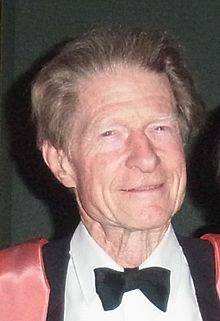John Gurdon
| Sir John Gurdon | |
|---|---|
 |
|
| Born | John Bertrand Gurdon 2 October 1933 Dippenhall, Hampshire, England |
| Citizenship | British |
| Nationality | English |
| Fields | Biology and Developmental Biology |
| Institutions |
University of Oxford University of Cambridge California Institute of Technology |
| Alma mater | Christ Church, Oxford |
| Thesis | Studies on nucleocytoplasmic relationships during differentiation in vertebrates (1961) |
| Doctoral advisor | Michael Fischberg |
| Doctoral students | Douglas A. Melton |
| Known for | Nuclear transfer, cloning |
| Notable awards |
William Bate Hardy Prize (1984) Royal Medal (1985) International Prize for Biology (1987) Wolf Prize in Medicine (1989) Edwin Grant Conklin Medal (2001) Albert Lasker Basic Medical Research Award (2009) Nobel Prize in Physiology or Medicine (2012) |
|
Website www |
|
Sir John Bertrand Gurdon FRS FMedSci (born 2 October 1933), is an English developmental biologist. He is best known for his pioneering research in nuclear transplantation and cloning. He was awarded the Lasker Award in 2009. In 2012, he and Shinya Yamanaka were awarded the Nobel Prize for Physiology or Medicine for the discovery that mature cells can be converted to stem cells.
Gurdon attended Edgeborough and then Eton College, where he ranked last out of the 250 boys in his year group at biology, and was in the bottom set in every other science subject. A schoolmaster wrote a report stating "I believe he has ideas about becoming a scientist; on his present showing this is quite ridiculous." Gurdon explains it is the only document he ever framed; Gurdon also told a reporter "When you have problems like an experiment doesn't work, which often happens, it's nice to remind yourself that perhaps after all you are not so good at this job and the schoolmaster may have been right."
Gurdon went to Christ Church, Oxford, to study classics but switched to zoology. For his DPhil degree he studied nuclear transplantation in a frog species of the genus Xenopus with Michael Fischberg at Oxford. Following postdoctoral work at Caltech, he returned to England and his early posts were at the Department of Zoology of the University of Oxford (1962–71).
Gurdon has spent much of his research career at the University of Cambridge, first at the MRC Laboratory of Molecular Biology (1971–83) and then at the Department of Zoology (1983–present). In 1989, he was a founding member of the Wellcome/CRC Institute for Cell Biology and Cancer (later Wellcome/CR UK) in Cambridge, and was its Chair until 2001. He was a member of the Nuffield Council on Bioethics 1991–1995, and Master of Magdalene College, Cambridge, from 1995 to 2002.
...
Wikipedia
